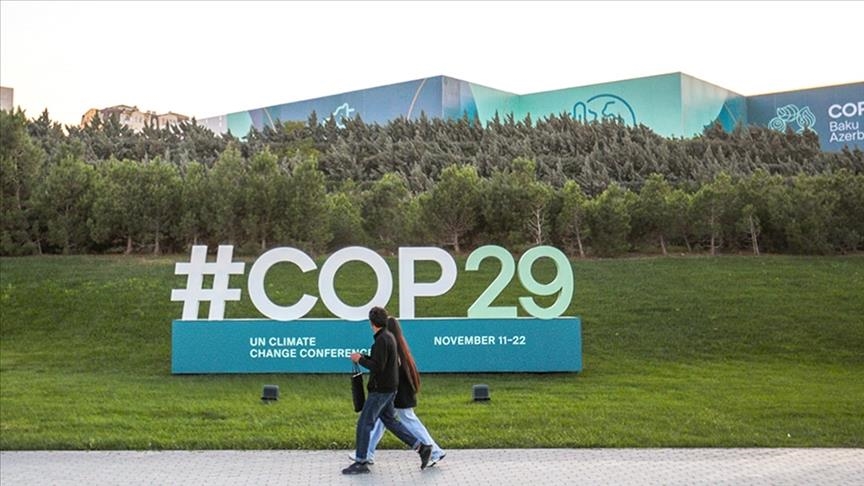OPINION - At a crossroads: COP29 and global energy transition
COP29 arrives at a pivotal moment. Success in Baku hinges primarily on delivering a robust New Collective Quantified Goal on climate finance that moves beyond the inadequate $100 billion target to meet the actual needs of developing nations

- With the global energy transition now unstoppable, the question is no longer whether we will transition, but whether we can manage this transformation in a way that is both just and swift enough to avert catastrophic climate impacts
The author is an associate fellow at Chatham House.
ISTANBUL
As the world turns its attention to Baku for the United Nations (UN) Framework Convention on Climate Change (COP29), Azerbaijan finds itself at the intersection of traditional energy systems and climate imperatives. Like last year's host, the United Arab Emirates (UAE), Azerbaijan brings to the presidency both the expertise of a significant energy producer and the perspective of a country facing its own climate vulnerabilities. This position offers unique insights into the challenges and opportunities of transitioning to cleaner energy systems in a warming world.
Governments are increasingly transitioning to clean energy
The summit's primary task is securing agreement on climate finance—specifically, the New Collective Quantified Goal (NCQG) that will replace the previous $100 billion annual target. This goal, which developing nations argue should be in the trillions, not billions, is crucial for enabling climate action in countries that lack the means to fund their own transition. But the negotiations face significant headwinds, with developed nations resistant to dramatically increasing their contributions and disagreements over who should pay.
In my years tracking climate negotiations, the implementation of previous COP decisions has been mixed at best. The landmark $100 billion climate finance pledge from Copenhagen in 2009 was only met in 2022, two years after its deadline. The Paris Agreement's temperature goals look increasingly out of reach. And while last year's UAE Consensus at COP28 marked the first explicit agreement to transition away from fossil fuels, the policy actions needed to realize this commitment remain largely theoretical.
Yet despite this patchy record, we are witnessing an unprecedented transformation in global energy systems. Solar deployment hit a staggering 347 gigawatts (GW) in 2023. By 2027, solar power including storage is projected to be the cheapest electricity source in most regions globally. Clean energy is now meeting virtually all new electricity demand growth, while pushing coal into structural decline for the first time.
This transition isn't just about swapping one power source for another - it represents a fundamental reshaping of the global energy order. Countries that have built their economies and geopolitical influence on fossil fuel exports must now grapple with the reality that their primary asset is slowly becoming a liability. Meanwhile, nations with abundant renewable resources and manufacturing capacity are positioning themselves as the energy superpowers of tomorrow.
The International Energy Agency (IEA) expects global oil and gas demand to peak by 2030, driven by increasingly competitive clean technologies and strengthening climate policies. The economics of renewable energy have reached a tipping point where deployment is now effectively irreversible. China alone will generate more solar electricity by the early 2030s than the entire current US electricity demand.
Yet this inevitable transition brings immense challenges. Grid infrastructure needs massive upgrading to handle intermittent renewables. Supply chains for critical minerals must be rapidly scaled and diversified. And the social impacts on fossil fuel-dependent communities and economies require careful management to ensure a just transition.
Azerbaijan, as COP29 host, exemplifies these transitional challenges. While it has a renewable energy capacity of 20% (mainly hydropower) and targets 30% capacity by 2030, it continues lobbying the European Union (EU) to support doubled gas exports, highlighting the complex balancing act many energy-producing nations face as they navigate this shift. The country's political economy, built around oil and gas revenues, creates powerful incentives to resist rather than embrace change.
International unity essential for energy transition
Let's be clear about what's at stake here: Time for such resistance is running out. Climate impacts are escalating faster than expected, while the window for orderly transition is narrowing. The latest science suggests we've already passed critical tipping points in the Earth system. The choice now is not whether to transition, but how disruptively it occurs.
COP29 thus arrives at a pivotal moment. Success in Baku hinges primarily on delivering a robust New Collective Quantified Goal on climate finance that moves beyond the inadequate $100 billion target to meet the actual needs of developing nations. This must be coupled with frameworks that address the systemic challenges of transition - from supporting fossil fuel-dependent nations in diversifying their economies to ensuring vulnerable countries can both adapt to climate impacts and leapfrog to clean energy systems.
Beyond the technical negotiations lies a deeper challenge: Forging international cooperation to navigate humanity's greatest economic transformation while racing against the climate clock. With the global energy transition now unstoppable, the question is no longer whether we will transition, but whether we can manage this transformation in a way that is both just and swift enough to avert catastrophic climate impacts. Success or failure in mobilizing adequate climate finance and managing this transition will shape not just our energy systems but the future of human civilization.
*Opinions expressed in this article are the author’s own and do not necessarily reflect Anadolu's editorial policy.
Anadolu Agency website contains only a portion of the news stories offered to subscribers in the AA News Broadcasting System (HAS), and in summarized form. Please contact us for subscription options.







